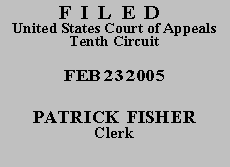

| UBALDO TRUJILLO-GARCIA,
Petitioner, v. ALBERTO R. GONZALES, Attorney General(*), Respondent.
|
(Petition for Review) |
Petitioner Ubaldo Trujillo-Garcia petitions for review of an order of the Board of Immigration Appeals (BIA) affirming the immigration judge's decision denying his request for cancellation of removal. Petitioner also filed a motion for stay of removal, which was denied by order of this court on July 26, 2004. Respondent filed a motion to dismiss the petition for lack of jurisdiction. Petitioner did not respond to the motion to dismiss; instead, he filed a second motion for stay of removal, in which he failed to address the basis for this court's jurisdiction. Petitioner finally submitted a response to the motion to dismiss after a third letter from this court requesting a response.
Respondent argues in its motion to dismiss that this court does not have jurisdiction because petitioner was found deportable for being convicted of an aggravated felony and a controlled substances violation. Section 309(c)(4)(G) of the Illegal Immigration Reform and Immigrant Responsibility Act (IIRIRA) states, "there shall be no appeal permitted in the case of an alien who is [] deportable by reason of having committed a criminal offense covered in . . . section 241(a)(2)(A)(iii) [aggravated felony], (B) [controlled substances] . . . ." (reprinted as amended in 8 U.S.C. § 1101, Historical and Statutory Notes, 1996 Acts).(1) Petitioner concedes that his drug possession charge is considered an aggravated felony under the current immigration laws. Pet. Stay Mot. at 2-3.
In his response to the motion to dismiss petitioner does not address the IIRIRA provision cited by respondent, he simply argues that this court has jurisdiction because the Supreme Court had jurisdiction in INS v. St. Cyr, 533 U.S. 289 (2001). Petitioner describes St. Cyr as a case "involv[ing] an alien, as here, who had committed an aggravated felon [sic], and who had a deportation or removal order against him." Pet. Resp. at 2. Petitioner fails to recognize, however, that St. Cyr involved a petitioner who filed a petition for writ of habeas corpus under 28 U.S.C. § 2241. In determining that it had jurisdiction, the Supreme Court in St. Cyr went to great lengths to distinguish habeas review from traditional appellate review. See St. Cyr, 533 U.S. at 298-314. St. Cyr does not support petitioner's argument that this court has jurisdiction over his appeal.
Petitioner also argues that we have jurisdiction because the respondent filed a non-opposition to his second motion for stay of removal. While it is true that respondent has now stated that it does not oppose petitioner's stay of removal, that does not impact our analysis because it does not change the language of IIRIRA's jurisdiction stripping provision. Finally, petitioner argues that there has been a change in the immigration laws that may now provide him relief, see 8 C.F.R. § 1212.3(h). This may be true, but petitioner's avenue for relief is to file a special motion to reopen with the BIA under 8 C.F.R. § 1003.44. Petitioner has informed this court that he has filed such a motion and an accompanying request for stay of deportation.
Accordingly, we DISMISS the petition for lack of jurisdiction and DENY the petition for stay as moot.
ENTERED FOR THE
COURT
*. On February 4, 2005, Alberto R. Gonzales became the United States Attorney General. In Accordance with Rule 43(c)(2) of the Federal Rules of Appellate Procedure, Mr. Gonzales is substituted for John Ashcroft as the Respondent in this action.
2. This order and judgment is not binding precedent, except under the doctrines of law of the case, res judicata, and collateral estoppel. The court generally disfavors the citation of orders and judgments; nevertheless, an order and judgment may be cited under the terms and conditions of 10th Cir. R. 36.3.
1. These transitional rules apply to petitioner because removal proceedings were initiated against him before April 1, 1997, and the BIA issued its final order of removal after October 31, 1996. See, e.g., Desta v. Ashcroft, 329 F.3d 1179, 1180 n.1 (10th Cir. 2003).